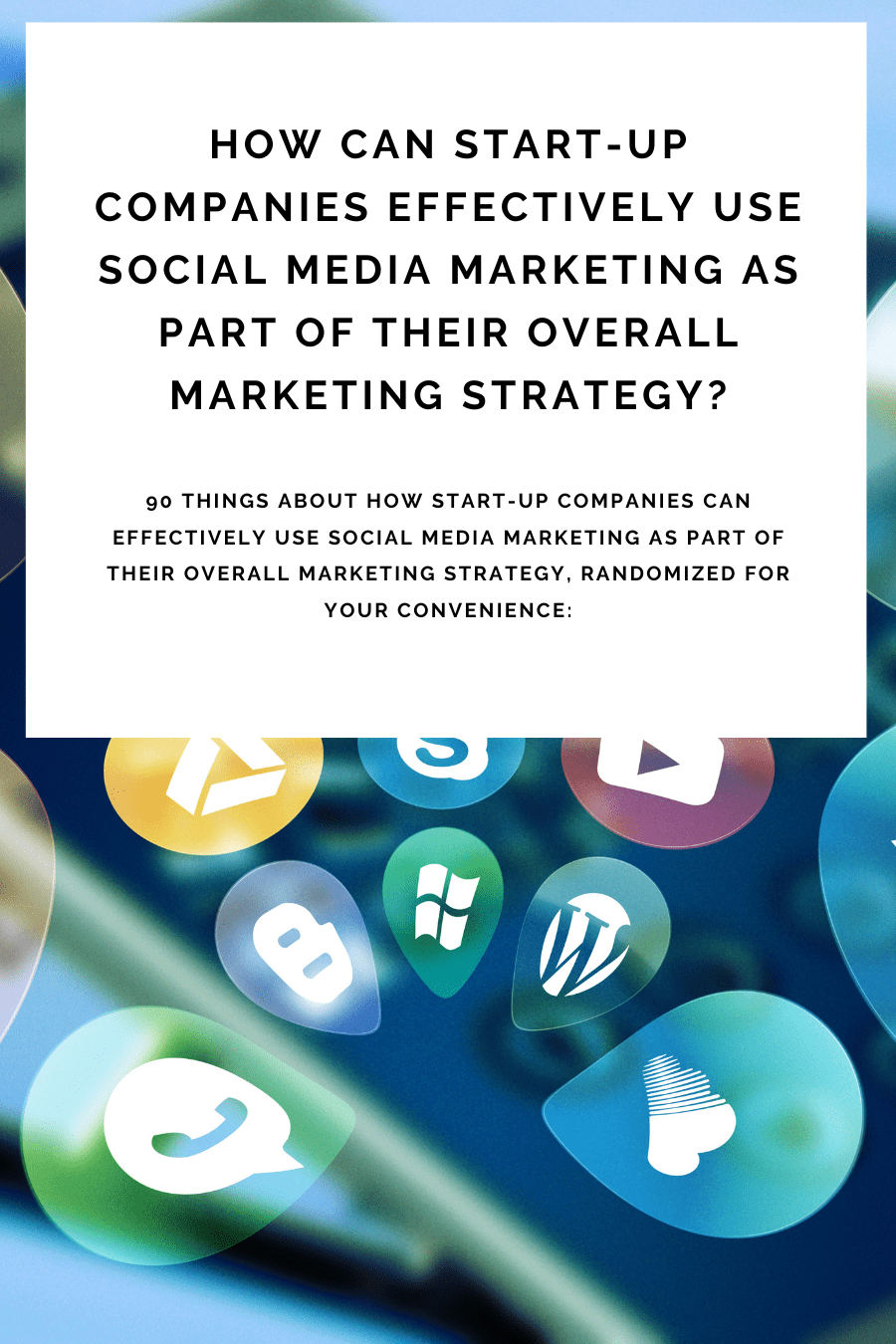90 Social Media Marketing Strategies for Start-Up Success
Reach the Top of Search Results with Amazing SEO Digital.
CONTENT MARKETING FAQ
Using social media to connect with customers has become crucial for companies of all sizes
Establishing a business from scratch is not an easy feat. When starting a business, there are many moving parts, and marketing is no exception. Using social media to connect with customers has become crucial for companies of all sizes in the modern digital era. In this post, we’ll discuss how social media marketing might fit into the larger marketing plan of a young company

Choose your niche for Social Media Marketing.
Knowing who you’re trying to reach is the first step in any marketing plan. The group, who are they? Where do they stand on the needs, likes, and routines spectrum? Learning about your target demographic is essential to crafting successful social media campaigns that reach and engage your audience.
Choose the right social media platforms.
Each social media have different functions and user bases. Hence, it’s crucial to put your business’s social media platforms to the test to determine which ones work best for reaching your target audience and achieving your marketing objectives. If, for instance, you’re hoping to contact other working professionals, you could have the most successful advertising on LinkedIn. But, if your audience is comprised mainly of young people, social media sites like Instagram and TikTok may be more fruitful.
Create a content strategy.
When using social media to promote a business, it is essential to provide content that appeals to and engages with your intended audience. Hence, it is necessary to strategically plan and produce helpful content consistent with your brand’s tone and message. Additionally, to maintain your audience’s interest, you should incorporate a variety of material types within your writing.
Build a social media following.
Your social media marketing efforts will fail if you don’t work to increase your following. To expand your social media footprint, you may begin by following influential accounts, talking to your followers, and using hashtags. Connecting with other brands or influential people in your field is another great way to raise your profile.
Monitor and analyze your social media performance.
Due to the nature of social media marketing, continuous monitoring and analysis of results are a must. Metrics like as engagement, reach, and conversion rates may help you measure the success of your social media strategy and inform your long-term decisions for tweaks and refinements.
Use social media as part of your larger marketing plan.
You should use social media marketing to support and enhance your existing advertising initiatives and make them more effective. In addition, by combining your social media efforts with your other marketing platforms, you may more effectively build brand awareness and extend your reach.
A well-planned and maintained social media marketing campaign may be a game-changer for new businesses. You can use social media marketing to expand your brand’s reach, boost customer engagement, and expand your business if you take the time to learn about your target demographic, select the best social media platforms, develop a content strategy, grow your social media following, track your results, and incorporate social media into your overall marketing strategy.
90 things about how start-up companies can effectively use social media marketing as part of their overall marketing strategy, randomized for your convenience:
- Social media marketing can be a cost-effective way for start-ups to reach their target audience.
- Start-ups can use social media to build brand awareness and credibility.
- Social media marketing allows start-ups to engage with their audience in real time.
- Start-ups can use social media to showcase their products or services.
- Social media platforms have different user demographics, and start-ups should choose the most relevant platforms for their target audience.
- Start-ups can use social media to drive traffic to their website.
- Social media can help start-ups gather customer feedback and insights.
- Start-ups can use social media to stay up-to-date with industry trends and competitors.
- Social media can be used to promote events or promotions.
- Start-ups can collaborate with other businesses or influencers on social media.
- Social media can help start-ups generate leads and sales.
- Start-ups should set clear goals and objectives for their social media marketing strategy.
- Social media marketing should be integrated into the start-up’s overall marketing strategy.
- Start-ups should choose the right social media platforms based on their business goals and target audience.
- Start-ups should create a social media content calendar to plan their posts.
- Social media posts should be visually appealing and on-brand.
- Start-ups should post consistently to maintain engagement with their audience.
- Social media posts should provide value to the audience, such as helpful tips or entertaining content.
- Start-ups should use hashtags to increase the reach of their posts.
- Social media ads can be an effective way for start-ups to reach a larger audience.
- Start-ups should monitor their social media metrics to track the success of their marketing efforts.
- Social media marketing can build a community around the start-up’s brand.
- Start-ups can use social media to establish themselves as thought leaders in their industry.
- Social media can be used to humanize the start-up’s brand and connect with customers on a personal level.
- Start-ups should use social media to respond to customer inquiries or complaints promptly and professionally.
- Social media can be used to showcase the start-up’s company culture and values.
- Start-ups should use social media to promote their unique selling proposition.
- Social media can be used to share customer success stories or testimonials.
- Start-ups should use social media to promote their content, such as blog posts or podcasts.
- Social media can be used to host contests or giveaways to increase engagement.
- Start-ups should use social media to announce new products or services.
- Social media can provide behind-the-scenes looks at the start-up’s operations.
- Start-ups should use social media to promote their partnerships or sponsorships.
- Social media can be used to recruit new employees or collaborators.
- Start-ups should use social media to share their philanthropic efforts or social responsibility initiatives.
- Social media can be used to conduct market research or surveys.
- Start-ups should use social media to support customers and answer frequently asked questions.
- Social media can be used to promote the start-up’s website or blog.
- Start-ups should use social media to provide educational content to their audience.
- Social media can be used to promote the start-up’s participation in industry events or conferences.
- Start-ups should use social media to offer their followers exclusive offers or discounts.
- Social media can be used to cross-promote the start-up’s other social media accounts.
- Start-ups should optimize their social media profiles with clear and concise descriptions and relevant keywords.
- Social media can be used to promote the start-up’s referral program or loyalty program.
- Start-ups should use social media to showcase their awards or recognitions.
- Social media can be used to promote the start-up’s podcast or video series.
- Start-ups should use social media to promote their e-commerce store or online shop.
- Social media can be used to promote the start-up’s affiliate program.
- Start-ups should use social media to share relevant industry news or updates.
- Social media can be used to promote the start-up’s presence on other digital platforms, such as mobile apps or online marketplaces.
- Start-ups should use social media to collaborate with other businesses or individuals in their industry.
- Social media can be used to promote the start-up’s fundraising efforts, such as crowdfunding campaigns.
- Start-ups should use social media to share user-generated content, such as customer reviews or photos.
- Social media can be used to promote the start-up’s participation in community events or charity initiatives.
- Start-ups should use social media to provide tips or advice about their industry.
- Social media can be used to promote the start-up’s referral program or loyalty program.
- Start-ups should use social media to share their brand story or mission.
- Social media can be used to promote the start-up’s offline events or pop-up shops.
- Start-ups should use social media to showcase their company’s milestones or achievements.
- Social media can be used to promote the start-up’s webinars or online courses.
- Start-ups should use social media to promote their newsletter or email list.
- Social media can be used to promote the start-up’s affiliate program.
- Start-ups should use social media to share relevant memes or trending topics related to their industry.
- Social media can be used to promote the start-up’s customer loyalty initiatives, such as reward points or VIP programs.
- Start-ups should use social media to provide updates on their product development or feature releases.
- Social media can be used to promote the start-up’s presence on review websites or directories.
- Start-ups should use social media to share their customer success stories or case studies.
- Social media can be used to promote the start-up’s online customer service channels, such as chatbots or virtual assistants.
- Start-ups should use social media to showcase their company culture and team members.
- Social media can be used to promote the start-up’s sustainability initiatives or eco-friendly products.
- Start-ups should use social media to share their thought leadership content, such as whitepapers or research studies.
- Social media can be used to promote the start-up’s social media contests or challenges.
- Start-ups should use social media to provide educational resources related to their products or services.
- Social media can be used to promote the startup’s support for social causes or charitable organizations.
- Startups should use social media to share their media appearances or interviews.
- Social media can be used to promote the startup’s participation in industry awards or competitions.
- Startups should use social media to provide a sneak peek at upcoming product launches or events.
- Social media can be used to promote the startup’s thought leadership on emerging industry trends or topics.
- Startups should share their business journey or startup story on social media.
- Social media can be used to promote the startup’s free trials or demos.
- Startups should use social media to provide tutorials or how-to guides related to their products or services.
- Social media can be used to promote the startup’s online webinars or virtual events.
- Startups should use social media to showcase their partnerships with other businesses or organizations.
- Social media can be used to promote the startup’s job openings or recruitment efforts.
- Startups should use social media to support customers and address any issues or concerns.
- Social media can be used to promote the startup’s participation in industry conferences or events.
- Startups should use social media to showcase their product or service demos.
- Social media can be used to promote the startup’s company news or press releases.
- Startups should use social media to engage with their followers and respond to comments or messages.
- Social media can track and analyze performance metrics, such as engagement rates or conversions, to continually optimize the startup’s social media marketing strategy.
Social media can be a powerful tool for startups to effectively market their brand and products/services to a broad audience. By creating a comprehensive social media marketing strategy, startups can increase their brand awareness, engage with their target audience, and drive traffic and conversions to their website or online store.


